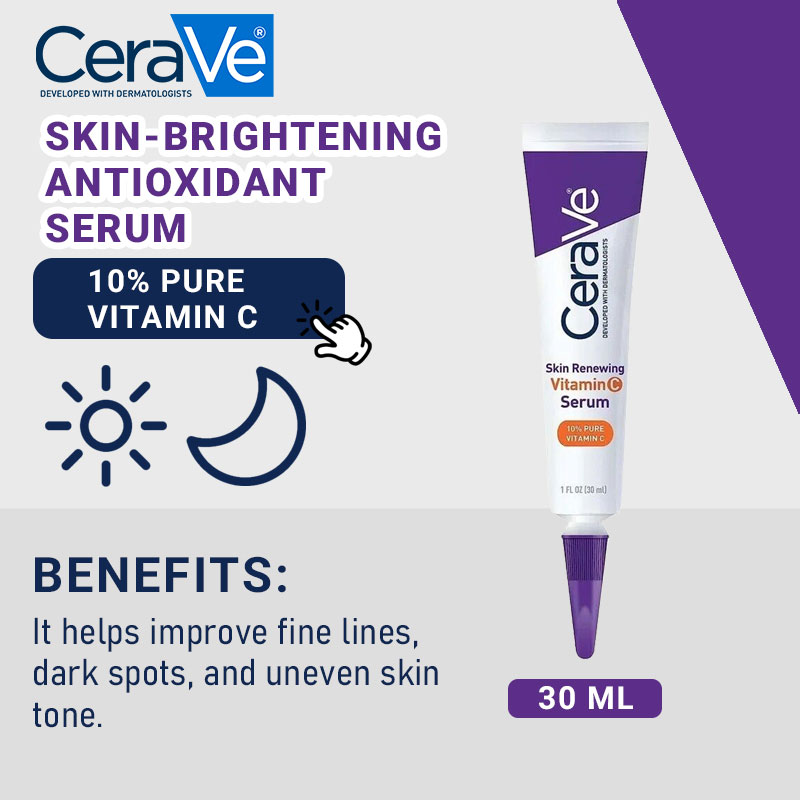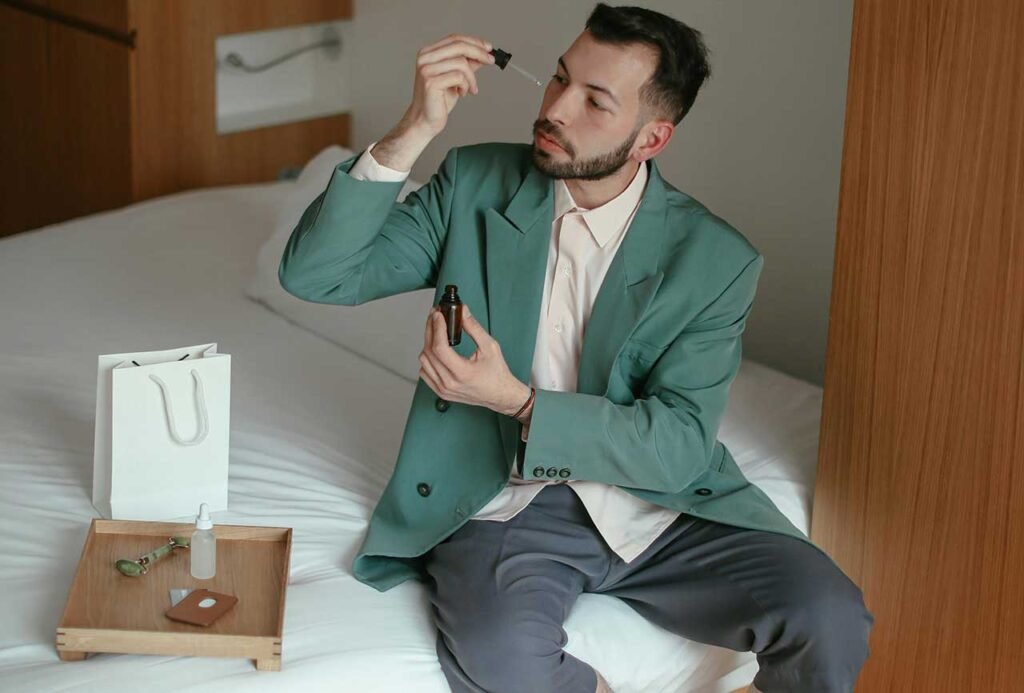Why Vitamin C Should Be in Your Skincare Routine: Benefits, Uses, and Myths Debunked
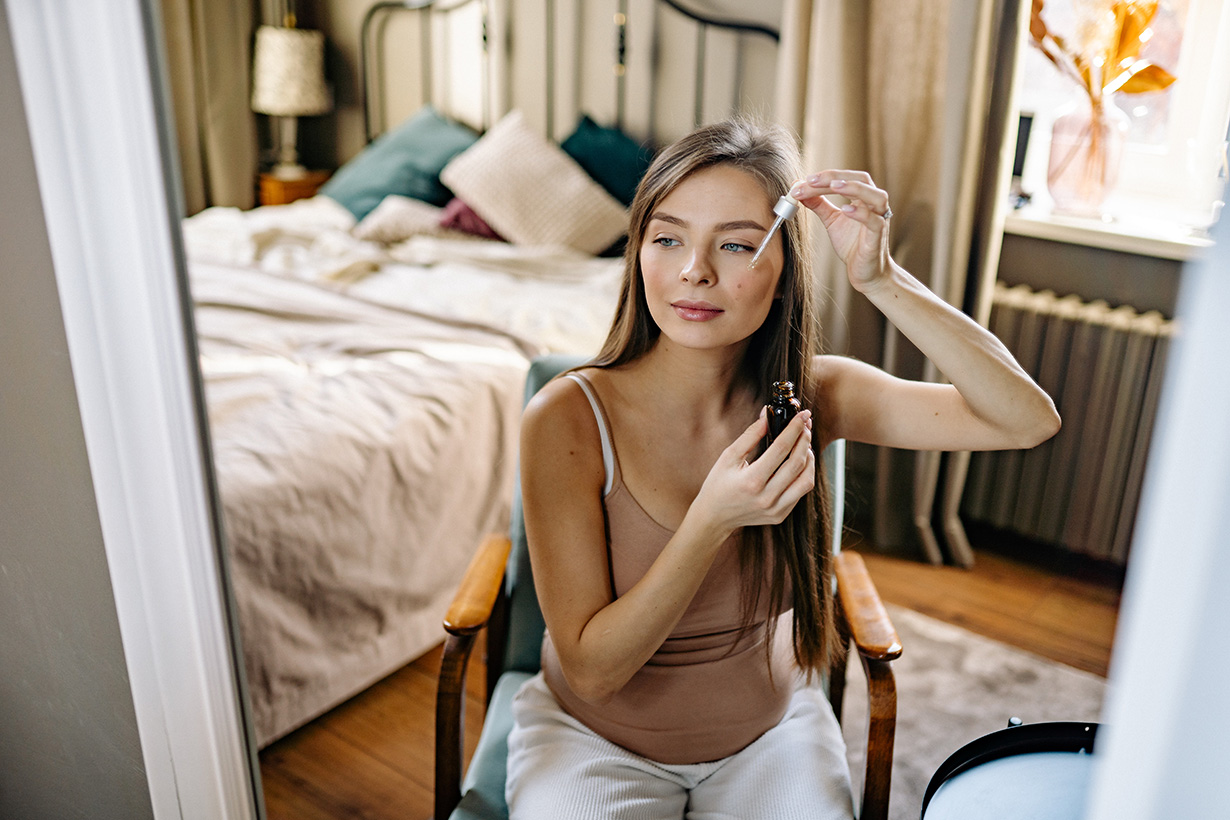
In Pakistan’s hot, humid, and often polluted environment, skin issues such as acne, dark spots, and sun damage are common concerns, particularly in cities like Karachi, Lahore, and Islamabad. With pollution and UV exposure wreaking havoc on skin, Vitamin C has become a go-to ingredient for healthy, glowing skin.
It is a powerful antioxidant that can brighten your skin and fight free radicals. It helps reduce dark spots and protects your skin from environmental damage. If you want great skin, don’t overlook Vitamin C serum.
Let’s look at how it works and how to add it to your skincare routine for the best results.
What is Vitamin C?
Vitamin C, or ascorbic acid, is a water-soluble vitamin and antioxidant that plays a vital role in maintaining skin health. While we get it from food like citrus fruits, strawberries, and bell peppers, applying Vitamin C directly to the skin is the most effective way to reap its benefits.
It’s well-known for its ability to brighten the skin, fade dark spots, and enhance collagen production. Unlike other nutrients, Vitamin C can penetrate deep into the skin, providing targeted benefits where they’re needed most. The power of Vitamin C lies in its ability to neutralize free radicals, repair skin damage, and even out skin tone.
How Does Vitamin C Improve Your Skin?
Vitamin C works in multiple ways to improve the skin’s overall appearance and health:
Antioxidant Protection
Vitamin C’s primary function is to protect the skin from environmental damage. According to an extract from the book Ascorbic Acid – Biochemistry and Functions, Vitamin C neutralizes harmful free radicals, helping to prevent oxidative stress, which can contribute to skin aging. This makes Vitamin C essential for individuals exposed to high pollution levels, like those living in urban areas of Pakistan.
Collagen Synthesis
Collagen is a protein that maintains skin structure and elasticity. A study by PubMed Central showed that Vitamin C improved collagen production and reduced wrinkles. This highlights Vitamin C’s role in enhancing skin texture and appearance, making it a key anti-aging ingredient.
Reduces Hyperpigmentation
One of Vitamin C’s most powerful benefits is its ability to reduce melanin production, the pigment responsible for dark spots, sun spots, and acne scars. By inhibiting melanin transfer, Vitamin C can gradually fade these spots, giving you a brighter, more even complexion.
A study published in JAMA Dermatology confirmed that Vitamin C significantly reduced pigmentation and dark spots, promoting a more uniform skin tone after 12 weeks. For many South Asians who struggle with post-acne pigmentation (PIH) or hyperpigmentation due to sun exposure, Vitamin C is a game-changer.
Skin Repair and Renewal
Vitamin C plays a vital role in the skin’s repair process. Research by Richard E. Fitzpatrick of Dermatology Associates of San Diego County shows that Vitamin C’s ability to boost collagen production aids in the repair of damaged skin, improving its overall texture.
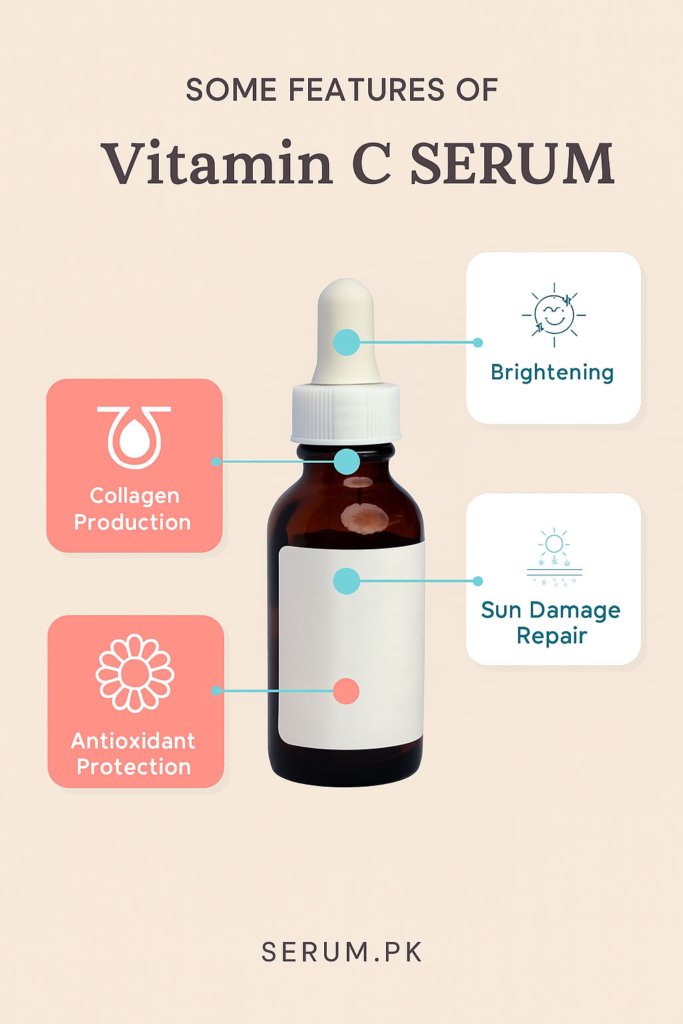
Who Can Use Vitamin C Serum?
Vitamin C is particularly beneficial for those dealing with the following concerns:
Oily and Acne-Prone Skin
Vitamin C helps to reduce inflammation and regulates sebum production, preventing acne breakouts.
Hyperpigmentation
Those with dark spots, sun spots, or acne scars can benefit from Vitamin C’s ability to fade hyperpigmentation and even out skin tone.
Aging Skin
Vitamin C helps combat fine lines and wrinkles by boosting collagen production and protecting the skin from UV-induced damage.
Sensitive Skin
Vitamin C is gentle enough for sensitive skin, provided you choose a mild formula (under 10% concentration).
How to Use Vitamin C Serum Effectively?
Choose the Right Vitamin C Serum
When selecting a Vitamin C serum, look for one that contains stabilized ascorbic acid or a derivative like sodium ascorbyl phosphate. A concentration of 10-20% is ideal for most skin types, but those with sensitive skin may want to start with a lower percentage.
Apply Twice a Day
Vitamin C serums are best applied in the morning and evening, ideally with an 8-hour gap.
Apply a few drops of serum to clean, dry skin, then follow up with sunscreen.
Vitamin C helps protect against UV damage, but it should always be paired with a broad-spectrum sunscreen for maximum protection.
Start Slow
If you’ve never used Vitamin C before, start with a lower concentration (10%) and apply it a few times a week. Gradually increase the frequency as your skin builds tolerance.
What to Pair Vitamin C With?
Vitamin C can be combined with several other skincare actives to enhance its benefits.
Hyaluronic Acid
Hyaluronic acid is a powerful humectant that draws moisture into the skin, helping to hydrate and plump the skin. When paired with Vitamin C, it boosts the serum’s hydrating effects while Vitamin C works on brightening and protecting the skin, as per an experimental study by NCBI. This combination is ideal for dry or dehydrated skin.
Vitamin E
Vitamin E is a potent antioxidant that works with Vitamin C to neutralize free radicals and provide added protection against environmental damage. Research shows that together, they enhance each other’s antioxidant properties, helping to combat signs of aging and pigmentation more effectively.
Ferulic Acid
Ferulic acid is another antioxidant that boosts the effectiveness of Vitamin C. When combined with Vitamin C and Vitamin E, it stabilizes the formulas, increasing their potency and extending their shelf life. This trio is often found in many high-end Vitamin C serums.
“Vitamin C is really hard to stabilize. It gets broken down and degrades easily. Ferulic acid helps prolong its shelf life and makes it more effective,” says Dr. Taryn Murray of the Cleveland Clinic.
What Not to Pair with Vitamin C?
Here are some actives that cause irritation or reduce the effectiveness of Vitamin C, if paired together:
Strong Exfoliating Acids (AHAs/BHAs)
Alpha Hydroxy Acids (AHAs) and Beta Hydroxy Acids (BHAs) are strong exfoliants that help remove dead skin cells. However, they can lower the skin’s pH, which can make Vitamin C less effective. Using Vitamin C with these acids can also cause irritation, especially for people with sensitive skin.
Retinol/Retinoids
Retinol and other retinoids help your skin renew itself, but can make it more sensitive. Using them with Vitamin C can irritate your skin and cause dryness. To prevent this, use Vitamin C in the morning and retinol at night.
Niacinamide (for some skin types)
Niacinamide helps reduce redness, control oil, and brighten skin. However, mixing it with Vitamin C can upset the skin’s pH balance. This can make both ingredients less effective. If you want to use both, apply Vitamin C in the morning and niacinamide in the evening.
What Happens If You Use Too Much Vitamin C on Skin?
Here’s what can happen if you overdo it with Vitamin C:
Skin Irritation
Using too much Vitamin C, especially in concentrations over 20%, can irritate sensitive skin. This irritation may cause redness, burning, stinging, or itching, especially if your skin barrier is delicate. You are more likely to experience skin irritation if you combine Vitamin C with other active ingredients like acids or retinoids.
Dryness and Tightness
Vitamin C can dry out your skin, especially if you use it too much. If your skin feels tight and looks flaky, it may mean your skin’s moisture barrier is damaged. To help with this, use a good moisturizer and try to use Vitamin C less often.
Increased Sensitivity to Sun
While Vitamin C provides some protection against UV damage, using too much can make the skin more sensitive to the sun. Overuse may lead to increased photosensitivity, which can result in sunburn or further skin damage if sunscreen is not applied.
Risk of Oxidation and Breakdowns
Using too much Vitamin C serum or applying it incorrectly can cause it to lose its effectiveness and become oxidized. Oxidized Vitamin C can block pores, which may lead to breakouts or skin problems. It’s important to choose a stable formula and avoid applying too much Vitamin C to your skin.
How to Avoid These Side Effects?
Start Slow
Begin with a lower concentration (10%) and use it 2-3 times a week, gradually increasing the frequency as your skin builds tolerance.
Choose the Right Formula
Opt for stabilized Vitamin C serums to ensure long-lasting potency without oxidation.
Balance with Moisturizer
Always apply a good moisturizer after Vitamin C serum to prevent dryness and irritation.
Use Sunscreen
Since Vitamin C helps protect against UV damage, make sure to wear sunscreen daily, especially if you’re using Vitamin C in your morning routine.
Listen to Your Skin
If you notice any irritation, reduce the frequency of use or switch to a gentler form of Vitamin C, such as ascorbyl glucoside or magnesium ascorbyl phosphate.
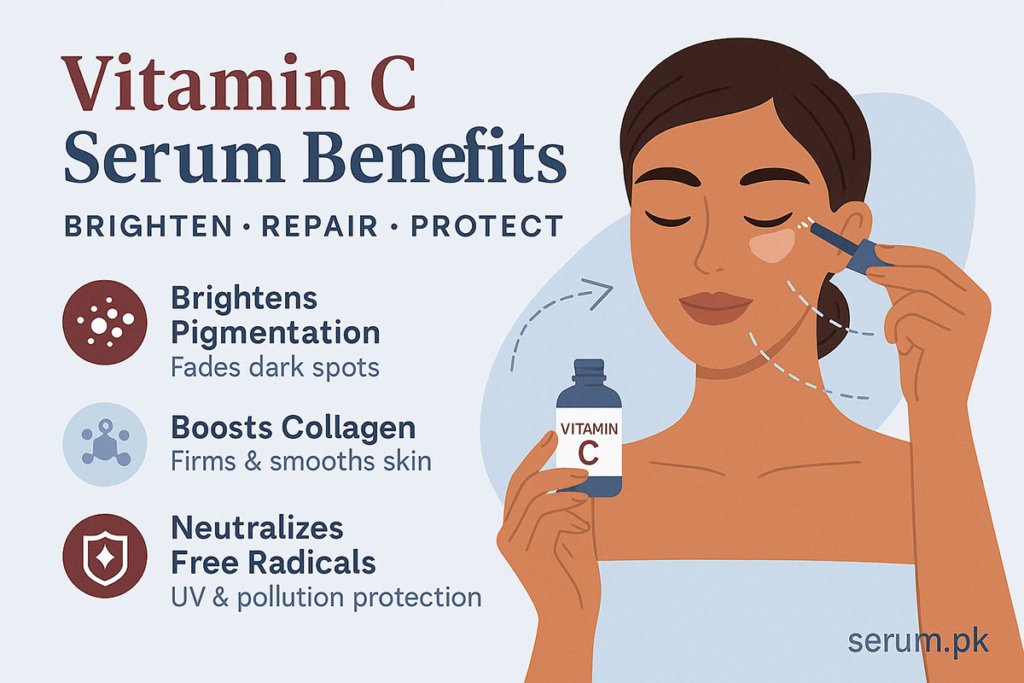
Unlock Radiant Skin Today: Shop the Best Vitamin C Serums at Serum.pk
Looking to add Vitamin C to your skincare routine? Visit Serum.pk for a curated selection of the best Vitamin C serums available in Pakistan. Whether you’re targeting pigmentation, wrinkles, or simply want to enhance your skin’s natural glow, we have something for every skin type.
We stock only dermatologist-approved, high-quality products from trusted brands. Explore our collection now and enjoy free delivery right to your doorstep, ensuring your skin gets the best care it deserves.
Few Recommended Products
Dr Rashel Vitamin C Serum
| Concern | Benefit |
| Signs of Aging | Reduces the appearance of wrinkles, fine lines and dark circles |
| Blemishes | It hydrates the skin and reduce inflammation |
| Pigmentation or discoloration | Even the skin tone by targeting the dark spots |
| Dull Skin | Helps to brighten the skin and make it look healthier |
La Roche Posay Vitamin C Serum
CoNatural Vitamin C Serum
FAQs About Vitamin C Serum
Can I use Vitamin C serum every day?
Yes, Vitamin C serum is safe for daily use. It’s best to apply it in the morning after cleansing, followed by a broad-spectrum sunscreen. For sensitive skin, start with a 10% concentration and gradually increase frequency.
Does Vitamin C help fade dark spots?
Absolutely! Vitamin C is known for its ability to reduce melanin production, which helps fade dark spots, acne scars, and hyperpigmentation, giving you an even skin tone over time.
What concentration of Vitamin C is best for my skin?
For beginners or those with sensitive skin, a 10% Vitamin C concentration is ideal. If your skin is more tolerant or if you’re aiming to target stubborn pigmentation, you can move up to 20%. Higher concentrations (over 20%) may cause irritation, especially for sensitive skin.
Should I use Vitamin C serum in the morning or at night?
Vitamin C is most effective when used in the morning, as it helps protect the skin from UV-induced damage and environmental stressors throughout the day. Be sure to follow up with sunscreen for maximum protection.
Can I mix Vitamin C with other active ingredients?
Yes, but be mindful of certain combinations. Vitamin C pairs well with Hyaluronic Acid, Vitamin E, and Ferulic Acid. However, avoid using it alongside strong exfoliating acids (like AHAs/BHAs) and retinol, as this can lead to irritation.
Can I use Vitamin C serum if I have sensitive skin?
Yes, Vitamin C is safe for sensitive skin, but start with a lower concentration (around 10%) and gradually build tolerance. Always perform a patch test before full application to avoid irritation.
Vitamin C is essential for any skincare routine. It brightens the skin and protects it from UV damage. It helps the skin produce collagen, reduces dark spots, and minimizes fine lines, making it great for anti-aging. If you have acne, dark spots, or early signs of aging, Vitamin C can help you achieve clearer, brighter, and healthier skin.
For best results, make Vitamin C serum a regular part of your morning routine, and pair it with a high SPF sunscreen. With consistent use, you’ll see an improvement in skin tone, texture, and overall radiance.
- The Benefits of Vitamin C (WebMD)
- Antioxidant Roles/Functions of Ascorbic Acid (Vitamin C) (IntechOpen)
- The Roles of Vitamin C in Skin Health (PubMed Central)
- Use of Topical Ascorbic Acid and Its Effects on Photodamaged Skin Topography (JAMA Dermatology)
- Double-Blind, Half-Face Study Comparing Topical Vitamin C and Vehicle for Rejuvenation of Photodamage (Wiley Online Library)
- Why is Topical Vitamin C Important for Skin Health? (Harvard Health Publishing)
- Efficacy of Topical Vitamin C in Melasma and Photoaging: A Systematic Review (PubMed)
- Vitamin C in Dermatology (PubMed Central)
- The Power of Vitamin C in Cosmetic Formulation (Learn Canyon)
- The Role of Vitamin C in Pushing Back the Boundaries of Skin Aging (NCBI)
- Benefits of Ferulic Acid as Part of Your Skin Care Routine (Cleveland Clinic)
About Mahrukh Kureshi
As a content and copywriter, I focus on creating helpful, trustworthy content that actually answers what people are searching for. I don't just write; I find out people's pain points and then carry out proper research to give them the solutions they're looking for. As for all the skincare-related content is concerned, it is written in collaboration with certified dermatologists and reviewed by skincare professionals, so the information is always on-point. With so much misinformation and uncited details online, I bring you content grounded in facts, not guesswork!
View all posts by Mahrukh Kureshi




